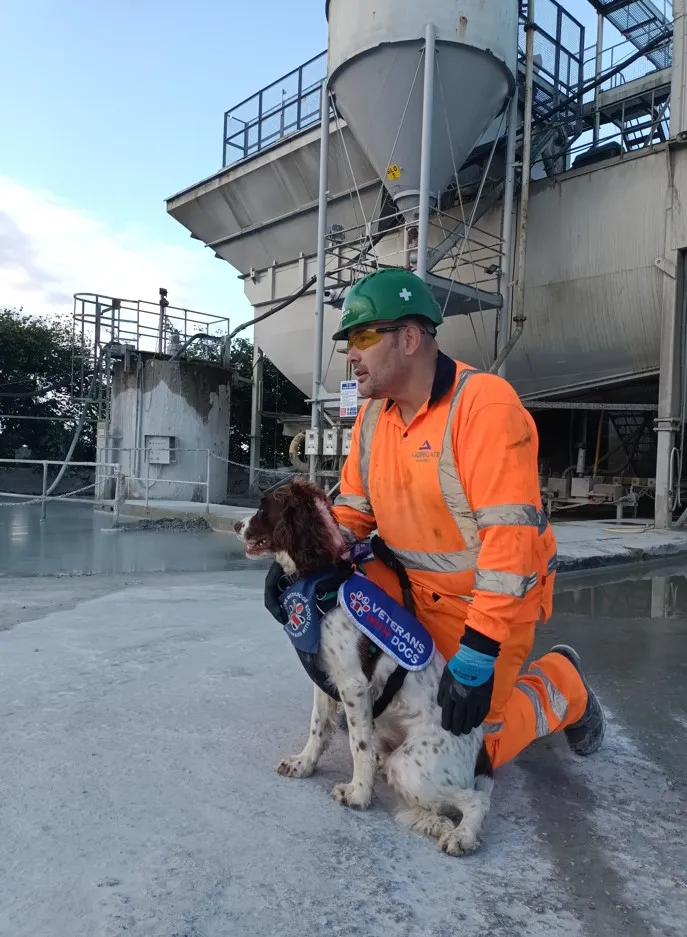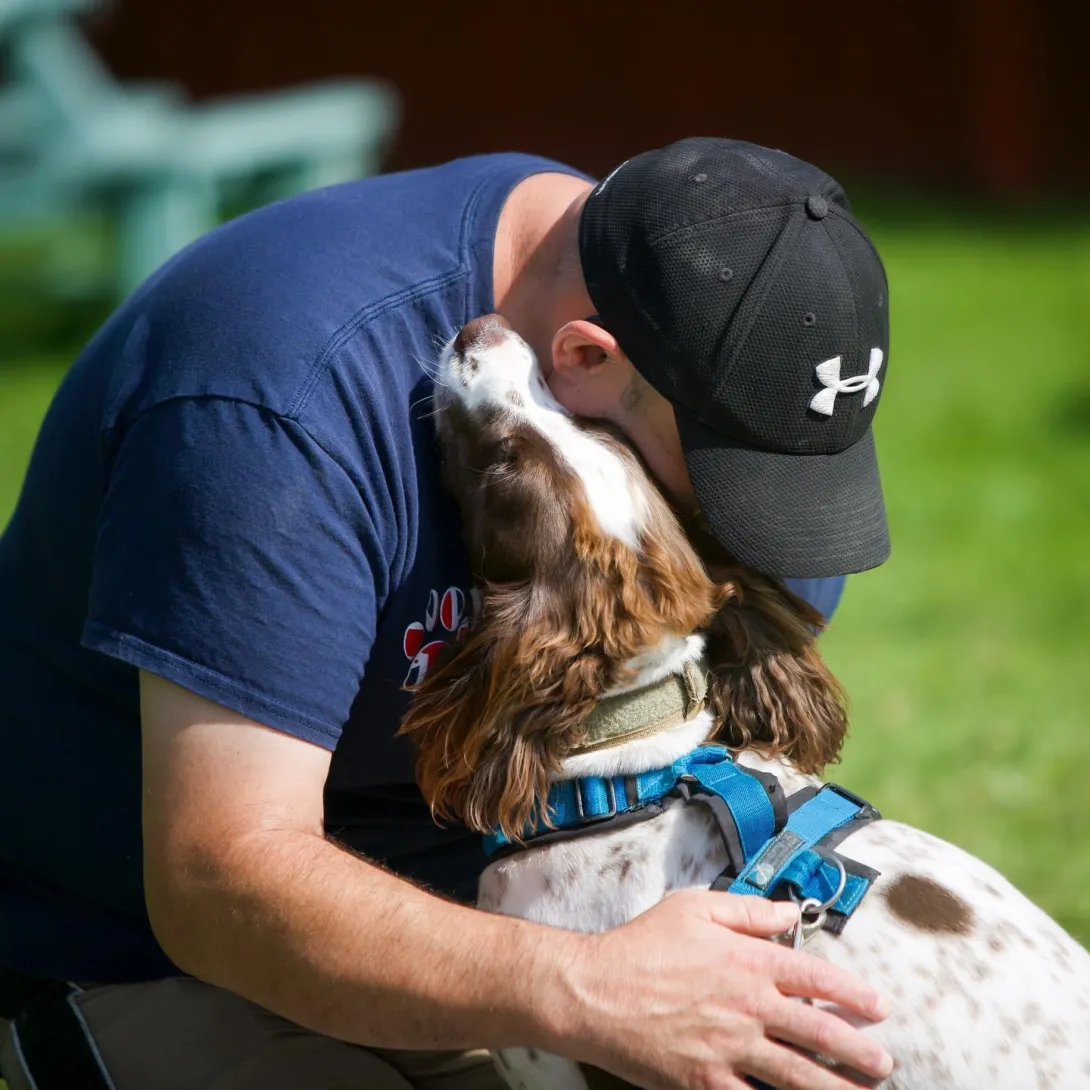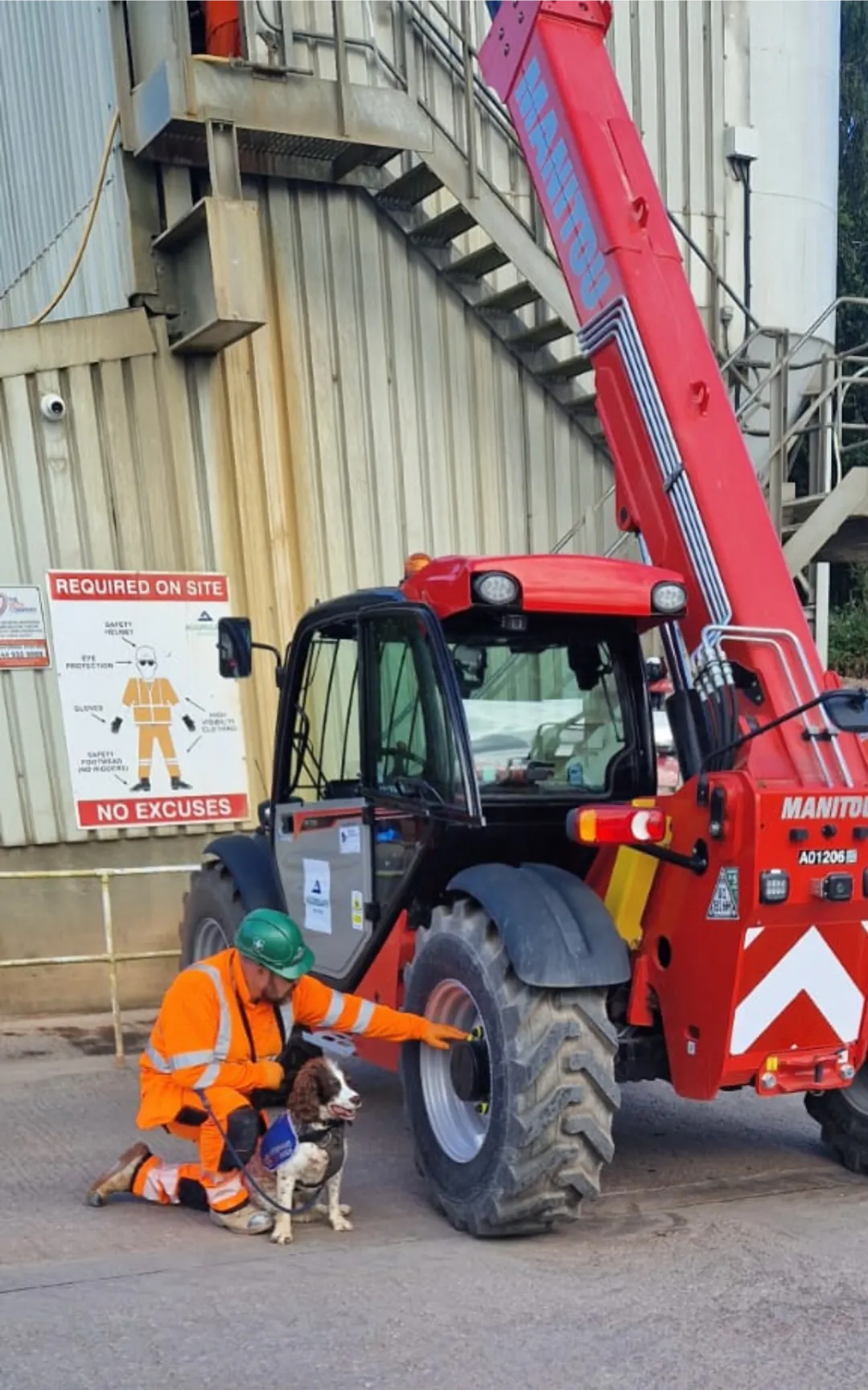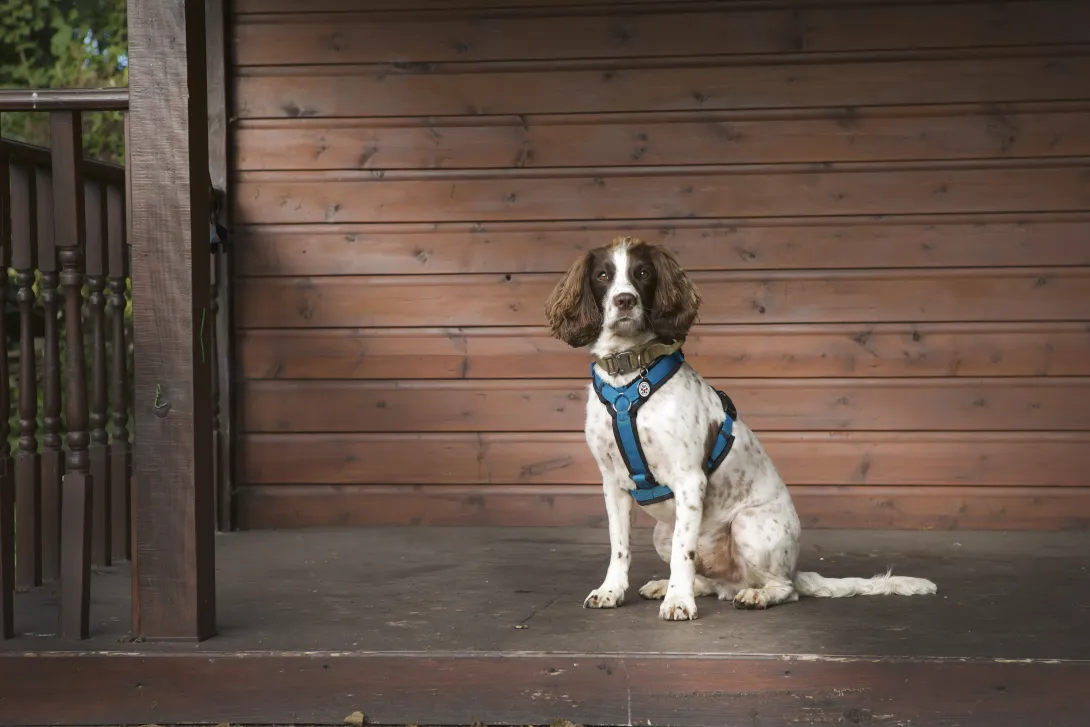one man and his dog
This year’s theme for World Mental Health Day is about prioritising mental health in the workplace. Aggregate Industries operations manager Nick Thomas tells his own personal mental health story and how he went from the army to managing busy concrete sites and why it took a breakdown and a four-legged friend to help turn his life around.

For army veteran Nick Thomas it is not an understatement to say he may not be here today if it wasn’t for his dog Buzzby. Waking up in a hospital bed in 2017 after a failed attempt to take his own life, he finally accepted he had to get help.
With support from charities including Help for Heroes and Combat Stress, Nick was diagnosed with Post Traumatic Stress Disorder (PTSD) and he started to map out his recovery. Having joined the army straight from school in 1991, being a soldier was all he had ever wanted to do. After basic training he embarked on his first tour of Northern Ireland as part of the Princess of Wales regiment and the reality of being in the army on active service soon hit home.
Nick said: “It was a tough tour right from day one. I remember going out on patrol and straight away having contact and being fired upon. We lost two RUC (Royal Ulster Constabulary) officers that day. I did three tours of Northern Ireland in total as well as tours of Kosovo and Bosnia and training tours in Canada, Kenya and Italy.
“I loved being in the army. I worked hard and I played hard - the culture at the time was not to admit to any problems or difficulties. I had my career mapped out for me - I was planning a full service with never an intention of leaving, just going on tour after tour but that all changed in one night.”
The night before Nick was due to be deployed back to Northern Ireland and then onto the Gulf with his regiment he was in a local pub and during a disagreement a man pulled out a knife and stabbed him in the arm.
Not only did it mean he couldn’t join the tour, the resulting injuries caused long term damage and ultimately, his exit from a job he loved.

“It caused permanent damage and I lost the feeling in my right hand. It led to me being medically discharged from the army in 1997 after six and a half years. Being a soldier was all I had known. I drifted into civilian instruction and trained Royal Engineers for a further five years but that then became privatised so for the first time I was out of the services. At the time I had a pregnant wife and was coming out of the army having known nothing else - I’d lost my career, my home - I didn't know about paying rent or bills as that was all taken care of. I had no social skills as I’d left school and gone straight into the forces.”
A life outside the army
In 2003 Nick joined Aggregate Industries as a labourer working at its Chatham cement terminal, progressing through a number of roles and becoming a team leader and manager.
“I really enjoyed it and progressed upwards moving around the cement terminals and then took on a role overseeing all of our four UK terminals which suited me. At the time we had just taken over a plant in Northern Ireland and I was asked to go over and show the team over there how our systems worked and how we did things. Naturally, I just said yes and I never thought of it being an issue.
“But as soon as I got there I felt this discomfort which I couldn’t explain. A lot of unwanted memories that I had pushed away came flooding back. For me, it was like walking back in time and I was back on day one of the tour. I was meant to be there for four weeks but came back after two.
“I started to get flashbacks and nightmares but I just thought I could work through it. Then I had a breakdown while sitting in my car - I just put it down to working too hard and I needed to chill. I relocated to Plymouth, which is what I really wanted and the company helped to make it happen. At the time I didn’t even know I was ill.”

The road to recovery
It was while in Plymouth Nick made an attempt on his life and he started receiving support from veteran related charities.
“I was diagnosed quite quickly with PTSD. This was when it was first suggested an assistance dog could be beneficial but at this stage I was still in denial. I realised I had to listen and I held my hands up and asked for any help I could get.
“I had just moved into the Readymix part of our business and spoke to my manager and said I needed help which is a really hard thing to do but he has been fantastic from day one and supported me every step of the way.
“I went on a residential programme led by Combat Stress. The programme helped me learn about PTSD and understand what was wrong and there was no wonder cure. It taught me coping mechanisms and explained why I was getting certain thoughts and I started my recovery plan. I had to admit I was broken - I didn’t want the label but had to accept it. They again suggested an assistance dog could help and I agreed. It was one of the best decisions I ever made.”
Charity, Veterans With Dogs, got involved and matched Nick with a dog to suit his needs and specific requirements.
Enter Buzzby the springer spaniel puppy who first had to be socialised to Nick’s life which meant getting him used to his working environment and being on busy sites around machinery, lorries, plant equipment and noise.
Now six-years-old, Buzz as he is affectionately known, is almost part of the scenery on Aggregate Industries’ sites in Devon and Cornwall.
Nick said: “He supports me at home and at work. He grounds me. He reminds me to take my medication in the morning, opening the drawer where it is kept.
“When I start to become stressed or agitated I can start to twitch. Buzz picks up on physical and emotional triggers and he jumps up and alerts me and I know it is time to take time out. I use him as a grounding technique like some people may use a stress ball.
“I know because of the PTSD I can go flash-bang very quickly and Buzz knows this and can diffuse a situation. At home he does the same. He can intervene when he senses I am getting stressed. Previously, I may have thrown my dinner across the room or had a blazing row.
“I have regular night terrors and he sleeps in our room and wakes me up if I am having one. In the past I have lashed out at people in my sleep not knowing what is going on.
“I still get anxiety and unwanted thoughts but I now have techniques to tackle those. I can lead a normal life. I can go out on my own. I can be a husband and a father - things I’d stopped being when the PTSD was at its worst. I didn’t realise that I’d virtually withdrawn from society. I was anxious and uncomfortable.
“But now I can go into town with Buzz and buy a pair of boots by myself - that’s a big thing- I couldn't do that before without someone being with me. That’s a massive achievement for me.
“I could run 10 sites at work and manage staff and keep everything going but I couldn't look after myself.”

In hindsight
Nick is reflective about how PTSD manifested itself and the effect it had on his life and his relationships.
He said: “PTSD hit me like an express train. I was arrogant towards mental health before this. I saw it as a weakness. I champion it now as I understand it.
“But I was ashamed and embarrassed. I knew close friends that had died and I felt because I wasn’t there on tour with them I had let them down. I carried that guilt and shame around with me for a long time.
“With hindsight, I know now there was nothing I could have done to change it but at the time I couldn't shift it. I just drifted away from friends and people in general.”
He is full of praise for how the company supported him throughout the process and helped him adapt to the new realities of his life.
“Aggregate Industries has been fantastic with me through all of this,” commented Nick. “They adjusted in order to deal with the situation, not just of me needing a dog at work, but having to get all my medication approved. People embraced it even though, initially, the obstacles were huge.
“It was new ground and there were big fear factors on both sides. The company worked with me and communication was key throughout this period. My manager, Ben, had to learn about it too and took advice from the charities involved. They basically advised him on the best way to communicate with me - they said speak to him like he's a dog- give him orders, ask him direct questions and be clear cut - that’s what works for me!
“The company changed the way they work and hopefully that has opened the doors for others in a similar situation. It is a massive positive in my eyes and for me it was life changing.”
Nick Thomas is 48 and is married with two children and lives near Plymouth. He works as an operations manager for Aggregate Industries Readymix division covering the south west region.
Press contacts
-
Telephone
01530 510066
-
Email
“The company changed the way they work and hopefully that has opened the doors for others in a similar situation. It is a massive positive in my eyes and for me it was life changing.”
- Aggregate Industries ventures into East Anglia with 800,000T capacity site
- Aggregate Industries launches the industry’s first carbon reporting tool to offer customers accurate carbon data by product or project
- Multi-million pound investment in state-of-the-art facility at the port of Liverpool
- Aggregate Industries launches significant report to analyse the true cost of coastal erosion
- Breaking new ground - Trial of new low carbon Foamix product complete
- New zero emissions mixer truck a thing of electric dreams
- A smooth sailing job as Aggregate Industries makes emergency return to boost Minehead's sea defences






